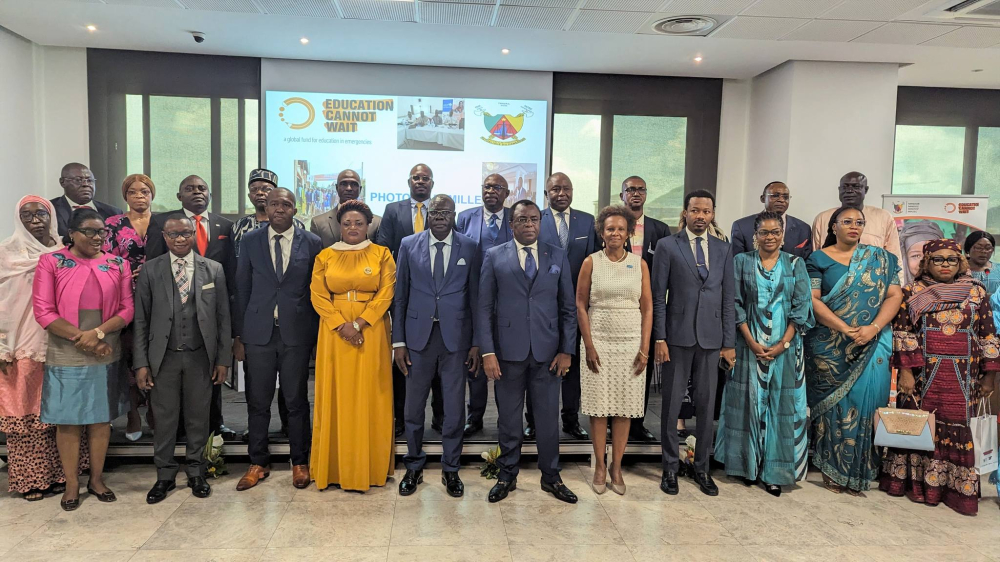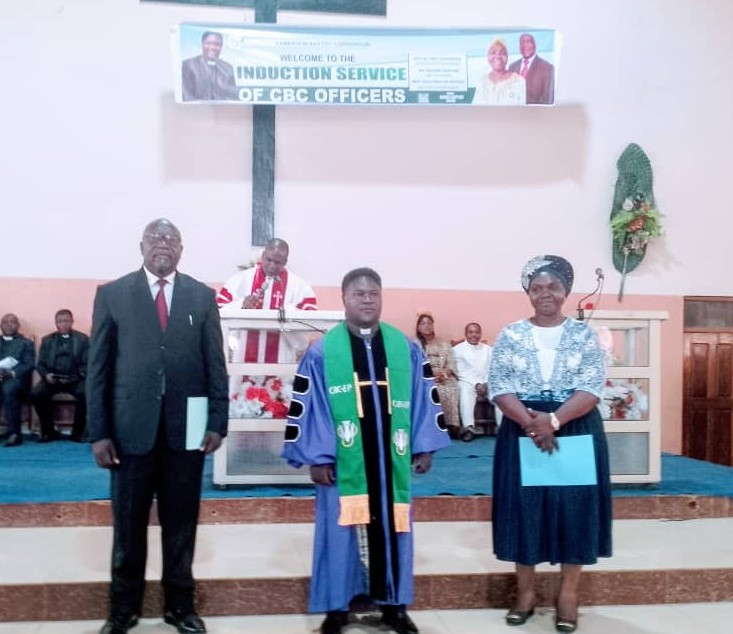Crisis-affected Regions Of Cameroon: Stakeholders Launch US$ 50 Million Education Appeal
- Par Kimeng Hilton
- 19 juin 2024 20:47
- 0 Likes

The funds will enable 454,000 children to benefit from quality education and protection services.
The Minister of Basic Education, Prof. Laurent Serge Etoundi Ngoa on Wednesday, June 19, 2024 in Yaounde chaired a meeting of members of the consortium of stakeholders supporting the Cameroon Multi-Year Resilience Programme, MYRP funded by Education Cannot Wait, ECW. During which an appeal was made for US$ 50 Million to enable 454,000 children to benefit from quality education and protection services in crisis-affected regions of the country.
Consortium Of Six
The consortium comprises the United Nations Children’s Fund, UNICEF; the United Nations Educational, Scientific and Cultural Organisation, UNESCO; the United Nations High Commission for Refugees, UNHCR; the World Food Programme, WFP; Plan International and the Norwegian Refugee Council, NRC. The Multi-Year Resilience Programme for Cameroon running from 2022-2025 is a multi-sectoral intervention in selected council areas affected by various crises, to enhance the access to quality inclusive education for school-age boys and girls.
Integrated, Holistic Support
The overarching objective of the programme is to provide an integrated and holistic support package. Including education, Water, Sanitation and Hygiene, WASH, protection, mental health and psychosocial support (MHPSS), gender, nutrition and agriculture-related activities. MYRP promotes continuous and inclusive access to quality education in safe and protective environments for children and adolescents of school age affected by the three crises in Cameroon (including internally displaced children, returnees, refugees and children living with disabilities). MYRP aims at creating and demonstrating successful and replicable models to enhance – through education and protection – human capital in the selected communities.
Devolving Resources To Councils
The crises in the South West, North West, East and Far North Regions have resulted in low enrolment. The Ministry of Decentralisation and Local Development has a major role to play since the management of basic education, Minister Etoundi Ngoa said. Given that resources and responsibilities have been devolved to some pilot local councils. He called on the Ministry of Decentralisation and Local Development to devolve resources and responsibilities to more councils in the country.
East Region MYRP Gains
The Minister lauded the gains so far made by the Multi-Year Resilience Programme. Citing the case of the East Region, he said it now has more digital containers donated by UNICEF than the Centre Region. He said this is seen in the improvements recorded in school performance and extra-curricular activities by East Region of late. Concluding, Minister Etoundi Ngoa appealed to partners and donors to help raise the funding gap of US$ 50 Million to enable 454,000 children in crisis-affected areas receive quality education and protection services.
No Time To Wait
UNICEF Cameroon Country Representative, Mrs. Nadine Perrault, addressed the gathering, including representatives of financial and donor institutions, on behalf of the Education Cannot Wait consortium. Disclosing that remarkable achievements have been made in two years for the programme running from 2022-2025. For example, the first grant of US$17 million from Education Cannot Wait targeted schools and centres in all 10 regions of the country, increased number of children with access to education, promoted access to education for approximately 92,000 primary school-age children, 48 per cent of whom are girls. Of this number, 23 per cent are internally displaced, 23 per cent are refugees, 54 per cent come from host communities and 434 live with disabilities.
Infrastructure, Other Support
The programme also saw the construction of adequate school infrastructure such as 43 classrooms with separate latrines out of the 60 planned. Infrastructure receptions are underway to be operational at the start of the school year in September 2024. Also, more than 500 teachers have been trained, particularly in psychosocial support, subject didactics, gender-sensitive pedagogy, and inclusive education. Training will continue at the start of the school year.
Capacity Building
Some 8 executives from MINEDUB, MINESEC, MINEFOP and MINJEC have been registered with the UNESCO International Institute for Educational Planning to follow training on sectoral policies and the management of education systems. As well as the steering and management of technical and vocational education and training. Mayors and basic education inspectors have been trained to effectively engage in the coordination and monitoring of the implementation of the MYRP in the 64 targeted councils.
Stationery Distributed
Under social protection, 92,000 children and their teachers received school and teaching material. Educational kits will be distributed to more than 150,000 children at the start of the school year in September 2024. While financial assistance was provided to 261 vulnerable families, enabling 753 school-age children in the East Region and 74 children in the Far North Region to access education. The school feeding programme covered nine schools, benefiting approximately 6,000 students, leading to an increase of approximately 20 per cent in school attendance in targeted schools.
Awareness Raising
On the other hand, awareness raising activities were carried out to strengthen access to legal identity through the issuance of birth certificates to unregistered school-going children. An operational guide for psychosocial support and disaster risk reduction in schools and training centres is being developed. An awareness caravan covered highways, schools and training centres, reaching approximately 22,000 children - to promote inclusion and psychosocial well-being.
Funding By Consortium
Nadine Perrault said the consortium in charge of implementing the Cameroon Multi-Year Resilience Programme put in $25 million in funding, which is crucial to address the challenge of financing education in crisis-affected regions in Cameroon. “As you know, the crises affecting the North-West, South-West and Far North Regions, as well as the presence of refugees in the East Region, have disrupted the lives of more than 1.4 million school-age children who need our support to exercise their right to education. A fundamental right for their development and their future,” she revealed.
Big Step Forward
“Our meeting marks a crucial step in the implementation of the Multi-Year Resilience Programme for the schooling of children affected by crises in 64 council areas of Cameroon. This programme is the result of a shared ambition: to provide children affected by crises with a set of interventions aimed at promoting quality inclusive education in a healthy, safe and protective learning environment.
Favourable Learning Environment
“MYRP programme is not just about building schools or distributing school supplies. It is about creating favourable conditions for children to learn, grow and flourish. It is about training teachers so that they are also equipped to offer psychological support to children who are affected by trauma. Finally, the Multi-Year Resilience...
Cet article complet est réservé aux abonnés
Déjà abonné ? Identifiez-vous >
Accédez en illimité à Cameroon Tribune Digital à partir de 26250 FCFA
Je M'abonne1 minute suffit pour vous abonner à Cameroon Tribune Digital !
- Votre numéro spécial cameroon-tribune en version numérique
- Des encarts
- Des appels d'offres exclusives
- D'avant-première (accès 24h avant la publication)
- Des éditions consultables sur tous supports (smartphone, tablettes, PC)













Commentaires